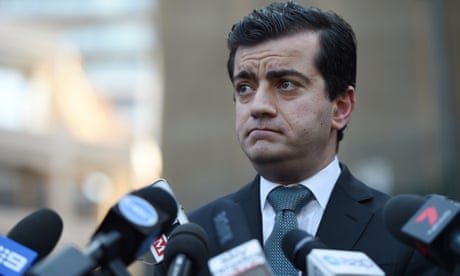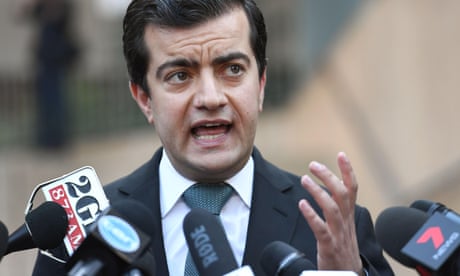BY ELIAS GROLL

Sen. Dianne Feinstein (D-Calif.) walks with Sens. Kamala Harris (D-Calif.) and Mark Warner (D-Va.) to a Senate Select Committee on Intelligence closed-door meeting at the U.S. Capitol in Washington on April 27, 2017.
A new Senate bill would expand the ability of American prosecutors to go after hackers abroad who attempt to steal trade secrets from U.S. firms, in the latest effort in Washington to crack down on Chinese economic espionage.
Under current law, the U.S. Justice Department is limited in its ability to bring charges of economic espionage against offenders abroad, and may only do so if the suspects are American citizens or permanent residents—or if an act to further the theft was committed in the United States.
A bill authored by Sen. Kamala Harris, a California Democrat, and set to be introduced Wednesday would loosen those requirements by amending the Economic Espionage Act.
Harris’s bill would allow American prosecutors to bring charges of economic espionage against individuals operating abroad if the act of theft has a “substantial economic effect” in the United States.
That reform would expand the jurisdiction of American prosecutors to bring economic espionage charges against hackers and operatives who operate with scant respect for national borders.
“It is absolutely vital that our approach to combating economic espionage is grounded in a modern-day understanding of the tactics employed by foreign actors and that our laws provide a strong deterrent to committing these acts in the first place,” Harris said in a statement to Foreign Policy.
The bill would also increase the damages companies are able to seek from individuals or groups that break into their computer systems to carry out economic espionage.
That reform would expand the jurisdiction of American prosecutors to bring economic espionage charges against hackers and operatives who operate with scant respect for national borders.
“It is absolutely vital that our approach to combating economic espionage is grounded in a modern-day understanding of the tactics employed by foreign actors and that our laws provide a strong deterrent to committing these acts in the first place,” Harris said in a statement to Foreign Policy.
The bill would also increase the damages companies are able to seek from individuals or groups that break into their computer systems to carry out economic espionage.
And it would extend the statute of limitations for such crimes and allow victims to bring civil suit against operatives working abroad.
Peter Harrell, a former State Department official and a fellow at the Center for a New American Security think tank, described the measure as a “useful step” in responding to Chinese economic espionage against the United States.
Deterring such espionage usually falls to the government, “but the U.S. also needs to make it easier for individual American companies that are victims of Chinese economic espionage to fight back,” Harrell said.
Peter Harrell, a former State Department official and a fellow at the Center for a New American Security think tank, described the measure as a “useful step” in responding to Chinese economic espionage against the United States.
Deterring such espionage usually falls to the government, “but the U.S. also needs to make it easier for individual American companies that are victims of Chinese economic espionage to fight back,” Harrell said.
“The threat of expanded damages could make the act more of a deterrent to Chinese hacking.”
American prosecutors have brought a series of indictments in recent months against Chinese operatives and intelligence officials alleged to have stolen U.S. intellectual property.
American prosecutors have brought a series of indictments in recent months against Chinese operatives and intelligence officials alleged to have stolen U.S. intellectual property.
But in those cases, authorities have typically relied on anti-hacking laws—as opposed to economic espionage statutes—to bring charges.
The bill comes amid escalating tensions between the United States and China over a wide-ranging campaign by Beijing’s operatives to steal U.S. trade secrets.
Speaking at an event in New York on Tuesday, Rob Joyce, a senior National Security Agency official, said Chinese hacking operations have grown more audacious in recent years.
The bill comes amid escalating tensions between the United States and China over a wide-ranging campaign by Beijing’s operatives to steal U.S. trade secrets.
Speaking at an event in New York on Tuesday, Rob Joyce, a senior National Security Agency official, said Chinese hacking operations have grown more audacious in recent years.
Xi Jinping's empty promises
In 2015, Barack Obama and Chinese dictator Xi Jinping pledged to halt hacking operations in support of economic espionage, but Beijing reneged on that agreement during the first two years of Donald Trump’s presidency.
U.S. prosecutors are expected to unveil a wide-ranging indictment this week targeting a well-known Chinese hacking group said to have targeted U.S. firms.
American officials are also expected to levy sanctions against Chinese operatives involved in the scheme.
Multiple media outlets reported this week that Chinese intelligence was responsible for a breach of hotel giant Marriott International that affected some 500 million guests.
While American officials describe China as the most prolific user of economic espionage, other U.S. adversaries, including Russia and Iran, are thought to employ the tactic as well.
Multiple media outlets reported this week that Chinese intelligence was responsible for a breach of hotel giant Marriott International that affected some 500 million guests.
While American officials describe China as the most prolific user of economic espionage, other U.S. adversaries, including Russia and Iran, are thought to employ the tactic as well.
“China is a player, but it’s not the only player in the game,” said a Senate aide familiar with the matter.
The bill could also have political benefits for Harris as Democratic politicians begin to position themselves for the 2020 presidential election.
The bill could also have political benefits for Harris as Democratic politicians begin to position themselves for the 2020 presidential election.
A former California attorney general, Harris is likely to seek her party’s nomination but would enter the race with relatively little foreign-policy experience.
By positioning herself as a champion of U.S. companies contending with Chinese economic espionage, Harris joins Sen. Elizabeth Warren, a Massachusetts Democrat, in signaling a hawkish approach toward Beijing.
By positioning herself as a champion of U.S. companies contending with Chinese economic espionage, Harris joins Sen. Elizabeth Warren, a Massachusetts Democrat, in signaling a hawkish approach toward Beijing.
Warren, in a speech last month, argued that China is “using its economic might to bludgeon its way onto the world stage and offering a model in which economic gains legitimize oppression.”



